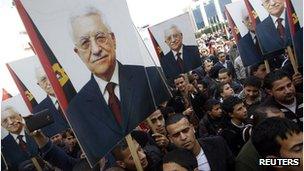France to back Palestinian bid for UN status
- Published

The Palestinian Authority president has said he does not want any confrontation with Israel or the US
France has confirmed it intends to vote for Palestinian non-member status at the United Nations later this week.
Foreign Minister Laurent Fabius said France had long backed Palestinian ambitions for statehood and would vote yes "out of a concern for coherency".
The Palestinians are asking the UN General Assembly to upgrade their status from permanent observer , externalto a "non-member observer state".
Israel and the US oppose the move, due to be voted on later this week.
They are concerned that the Palestinians are trying to seek full statehood via the UN, rather than through negotiation as set out in the 1993 Oslo peace accords under which the Palestinian Authority was established.
Washington has warned that it could hinder rather than help future dialogue.
Britain 'undecided'
"You know that for years and years France's consistent position has been the recognition of the Palestinian state," Laurent Fabius told the lower house of parliament.
"That is why when the question is raised on Thursday and Friday, France will respond with a 'yes'."
Backing international recognition of a Palestinian state was a campaign pledge made by Francois Hollande before he became France's president earlier this year.
It was a policy first set out by Francois Mitterand in 1982, and has been pursued by Mr Hollande's predecessor Nicolas Sarkozy.
However, Mr Fabius cautioned that the vote came at a delicate time - with a recent "extremely fragile" ceasefire between Israel and Hamas, looming Israeli elections and a new administration of re-elected US President Barack Obama.
"It's only with negotiations between the two sides that we demand immediately, without any preconditions, that a Palestinian state can become a reality," he said.
France - a permanent member of the UN Security Council - is the first major European country to come out in favour of the move.
Germany is expected to vote against, while the UK's ambassador to the UN, Mark Lyall Grant, said on Tuesday that London remained undecided.
According to AFP news agency, Mr Lyall Grant told reporters the UK thought the Palestinians should delay the application, but was still in talks with the Palestinian Authority and would decide "in due time" how to vote.
Austria says it will also back the Palestinian bid and claims that more than half of the European Union's 27 member states will vote for the proposal, AFP reports.
Observers say the application is likely win approval in the 193-member UN General Assembly, as it needs only a simple majority to pass. According to the Palestine Liberation Organisation (PLO), more than 130 countries already grant the Palestinians the rank of a sovereign state.
'Unilateral steps'
An upgrade in status would allow the Palestinians to participate in General Assembly debates and improve their chances of joining UN agencies and the International Criminal Court (ICC), although the process would be neither automatic nor guaranteed.
If they are allowed to sign the ICC's founding treaty, the Rome Statute, the Palestinians hope to take legal action in the court to challenge Israel's occupation of the West Bank.
The bid follows a failed attempt in 2011 by Mahmoud Abbas, the president of the Palestinian Authority and chairman of the PLO, to join the UN as a full member state. The proposal failed because of a lack of support in the Security Council.
As well as seeking to become a non-member observer state, the latest Palestinian resolution also calls for a Middle East settlement that "fulfils the vision of two states, an independent, sovereign, democratic, contiguous and viable state of Palestine, living side-by-side in peace and security with Israel, on the basis of the pre-1967 borders."
Israel opposes any pull-back to the 1967 lines.
Israeli foreign ministry spokesman Lior Ben Dor told the BBC earlier this month that President Abbas would be in breach of the Oslo peace accords if he continued to press for UN recognition.
And he warned that if the Palestinians sought to ask the ICC to resolve disputes with Israel, then Israel would "take unilateral steps to protect its interests".
He did not elaborate on what those measures would be, but reports in the Israeli media suggested they might include halting the transfer of tax revenue to the Palestinian Authority and restricting the movement of Palestinian officials through the West Bank.
President Abbas has said he does not "want any confrontations with the United States or Israel", adding: "If we can start a dialogue or negotiations the day after the [UN] vote, we will."
The Palestinians have long sought to establish an independent, sovereign state in the West Bank, including East Jerusalem, and the Gaza Strip. However, two decades of on-and-off peace talks have failed.
The latest round of negotiations broke down in late 2010 over the issue of Jewish settlement building in the West Bank and East Jerusalem. Attempts to restart direct talks have failed.
- Published30 November 2012
- Published24 November 2012
- Published14 November 2012
- Published14 August 2012